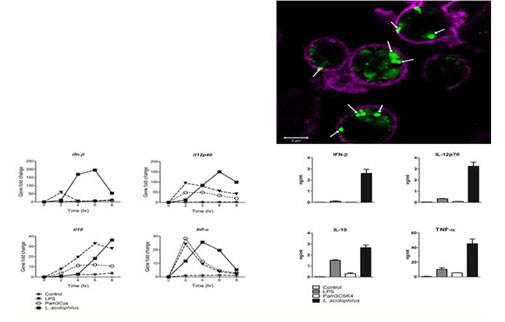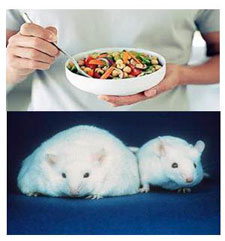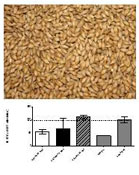Microbial and Nutritional Immunology (MiNI)
MiNI aims at investigating how microbes and compounds in our environment, in particular food components, affect the immune system.
Focus is to identify specific molecules and pathways involved in the interaction between microbes, food compounds and immune system and to improve our understanding of the underlying mechanisms in this interplay.
Overall, we aim to improve our understanding of the role of the immune system in health and disease and thus facilitating the identification of biomarkers of health and disease.
We work in the following focus areas:
 Dependent on specific molecular structures different microbes induce specific immune responses in antigen presenting cells (APCs).
Dependent on specific molecular structures different microbes induce specific immune responses in antigen presenting cells (APCs).
Depending on the specific properties of microorganisms these stimulate APCs such as dendritic cells (DCs) differently, in turn leading to distinct immune responses that efficiently stimulate anti-viral and adaptive immune responses or conversely, lead to a poor immune response, from which the microbe can escape.
Increased knowledge of the cellular and biochemical mechanisms behind an immune response against a microorganism may provide basis for development of new vaccines, treatment of various bacterial infections as well as increased understanding of how probiotics act on the immune system.
We are currently studying the cellular mechanisms induced in DCs upon encounter of different probiotic strains and staphylococci.
 The rapid development of the immune system during embryogenesis and in the early postnatal period is influenced by microbes and nutrition which may have long term effects.
The rapid development of the immune system during embryogenesis and in the early postnatal period is influenced by microbes and nutrition which may have long term effects.
The immune system develops rapidly during embryogenesis and in the early period after birth. We study the hematopoietic development in mice strains, how microbes and nutrients affect the immune development and how this in turn affects the development of diseases, e.g. Type 1 diabetes and propensity to infectious diseases.
Much of these activities are part of the research taking place in the Neomune Centre. In addition, we are involved in human trials assessing the development of the immune system in newborn infants and in 9-12 months old infants given probiotic bacteria (Probicomb project).
 Various food components may beneficially or adversely affect inflammatory states in the body. The effect may be direct or indirect through modulation of gut microbiota.
Various food components may beneficially or adversely affect inflammatory states in the body. The effect may be direct or indirect through modulation of gut microbiota.
We are partners in the 3G centre (Gut, Grains and Greens Centre), which investigates how dietary compounds affect the gut microbiota and how the gut microbiota affects health.
Our focus is to study how diet through the microbiota affects immune status.
In particular the effect of fibres, whole grain and gluten on the immune system is studied in animal models as well as in human intervention studies.
In mouse models, the effect of fibres on the immune system in both lean and high fat (HF) fed mice are assessed, and in humans the effects of whole grain and gluten, respectively, are studied in a group of over weighty individuals.
 Physical chemical properties of food compounds such as protein emulsions and fibres may affect their interaction with cells of the immune system.
Physical chemical properties of food compounds such as protein emulsions and fibres may affect their interaction with cells of the immune system.
We are studying the impact of structure and molecular interaction of proteins, lipids and fibres on their immune modulatory properties in monocytes and dendritic cells.
In particular, we study how emulsification of food proteins and other particles containing proteins affect absorption in monocytes, and how various properties of fibres, such as degree of polymerization and solubility influence the immune modulatory capacities of fibers.
The Neomune Centre
The NEOMUNE centre is a research platform aiming to improve clinical care of newborn infants, particular those born with developmental problems. We hypothesize that diet and gut microbiota interventions during the first weeks of life promotes immunity, gut and brain maturation, both short and long term. Studies in newborn infants are coupled with studies in newborn animals (piglets and mice).
The 3G centre (Gut, Grains and Greens Centre), which investigates how dietary compounds affect the gut microbiota and how the gut microbiota affects health.
Researchers
| Name | Title | Phone | |
|---|---|---|---|
| Search in Name | Search in Title | Search in Phone | |
| Frøkiær, Hanne | Professor | +4535333150 | |
| Mehlsen, Anni | Laboratory Technician | +4535336749 |
Contact
Group Leader:
Professor Hanne Frøkiær
Ridebanevej 9, st.
1870 Frederiksberg C
Ph: + 45 35 33 31 50
Hanne Frøkiær is a member of the FTP Council.
Project work
We are always keen to have both bachelor and masters students in our group. If you are interested in working with us you are welcome to contact us.
